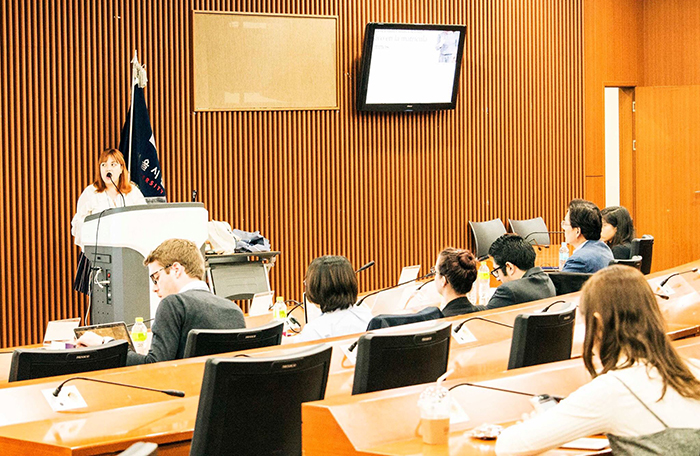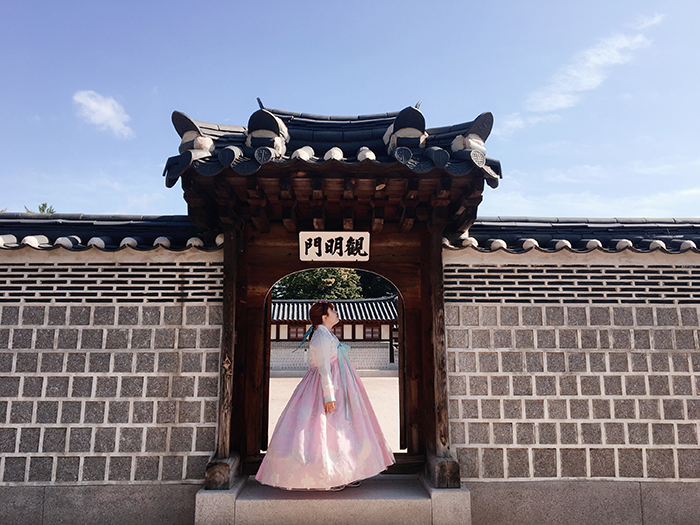View this article in another language
- 한국어
- English
- 日本語
- 中文
- العربية
- Español
- Français
- Deutsch
- Pусский
- Tiếng Việt
- Indonesian

Constanza Jorquera is a Hallyu scholar who conducts research on Korea at the University of Santiago. (Constanza Jorquera)
By Korea.net Honorary Reporter Kevelyn Ravelo Sarabia from Colombia
A decade ago, Hallyu surprisingly started to make its mark through the world, conquering corners that had previously known little of the Korean Wave or even Korea. Hallyu’s reach has since grown so big that people on all continents are talking about Korean music tours, film premieres and language academies. Latin America, for example, witnessed on March 23 last year one of the most important festivals for the K-pop industry, Music Bank, in Chile.
Chile, a country where Hallyu’s impact has been one of the most pronounced, is where Hallyu scholar Constanza Jorquera conducts research on Korea at the University of Santiago.
Jorquera, 28, holds a master’s in international studies and is pursuing a doctorate in American studies. The following are excerpts from an interview with her on Hallyu in Latin America and her research.
1. How did you get interested in Korean culture?
I've always been interested in Asian culture. During my childhood and teen years, I was a fan of Japanese pop culture like anime, manga and food.
As for Korea, because of my academic background in international studies, I’d always approached Korea from the perspective of international security such as the Korean War, the Cold War and the tension stemming from the nuclear threat of North Korea on the Korean Peninsula.
In Santiago, where I live, a district has a couple of streets similar to a K-Town with Korean restaurants, shops and supermarkets. I usually went there to buy food and skincare products or go to coffee shops, but had no idea that these urban spaces formed a fundamental component that fuels the global expansion of Hallyu.
While pursuing my master’s in 2014, I watched some K-pop music videos and liked them a lot, so I started following the first groups that I liked: EXO, SNSD, Super Junior, SHINee and Big Bang. Then in summer 2015, I started watching Korean videos, dramas and variety shows all the time and from that point, I started forming research questions in my mind. Soon after, I began to critically observe the Korean spaces where I went, read as many books and papers as possible on things Korean, and decided to study the Korean language to start developing this research topic.
I’ve also studied Korean culture in depth to better understand not only Korean society but also the political, historical, economic and social processes that allow better understanding of Korea today and how the country interacts with other international actors. This has greatly helped my research and teaching at my university.
2. How did you decide to combine your passion for Hallyu with your academic and professional life?
I think my strength is that I can understand Hallyu better because not only am I a researcher and academic but also a fan and consumer of Hallyu’s cultural products, which I find highly interesting and powerful. My profession is to analyze international politics, so this is why I always critically observe reality and ask many questions.
My discovery of Hallyu led me to generate multiple questions to understand how something as distant as Korean pop culture could be so successful despite the cultural and linguistic differences. How can a person who doesn’t speak the language and has never been to Korea identify with the country and want to enter its society? How were these things created and what is the Korean government’s role in promoting it?
To start on my research path, I decided to study Korean by enrolling at King Sejong Institute in April 2015. There, I had my first contact with the language, Korean teachers and people so different from me yet who shared a common love of Hallyu. I never thought I’d learn as much from them as I did.
This made me realize that Hallyu was a node connecting multiple aspects and actors of Korea as a study object like its history, economic development and international relations, and understanding that are the specificities of the country which allowed its emergence, evolution and transnational effects, visible at local level. Both young people dancing to K-Pop songs, families eating Korean food at Barrio Patronato, students of the Korean language and users of Korean beauty products -- all of them are living the K-lifestyle.
I combined all these things to form a winning article and won the Small Grant for Research Papers Contest of the Chilean-Korean Study Center Program (CHKSCP) at the University of Santiago; my essay was later presented at the former National Congress building in Santiago in July 2015. Two months later, I send my paper to the third Student Article Contest of the World Association for Hallyu Studies. Being among the winners allowed me to travel to the United Arab Emirates for talks at the highest intellectual level with experts in Hallyu studies.
This experience gave me the opportunity to form networks with other researchers worldwide, and this helped me grow not only at the professional level but also the human one because I consider the people I met as my friends. I went on to participate in the following World Congress for Hallyu in Oxford, England, in September 2016 and in Seoul in October 2017, unveiling each time the advances of my research discovering new elements.
In April 2017, I traveled to Busan for almost three weeks after winning the CHKSCP contest from my university, an honor that earned me an internship at Busan University of Foreign Studies. This great experience fulfilled a dream of mine to visit Korea, and I met many amazing people with whom I developed great friendships.
Since early 2016, I’ve taught at two universities in Santiago and actively participate in conferences, seminars and lectures, as well as giving guest lectures in classes taught by other colleagues. So I try to incorporate both my experience in and research on Hallyu whenever I can.

Hallyu scholar Constanza Jorquera of the University of Santiago in Chile gives a presentation on Hallyu. (World Association for Hallyu Studies)
3. How has the Korean Wave permeated Latin America?
Historically, Latin America hasn’t been a high priority for the actors that promote Hallyu, namely the Korean government and creative industries such as entertainment agencies, but the region has quickly shown itself as a key area for Hallyu’s expansion and consolidation. Latin American has the largest number of Hallyu fans and international media are paying attention to the great impact Hallyu has had on the region’s countries.
This change is more significant for K-pop because the internet has allowed wider consumption of Korean dramas, variety programs and movies. Famous Korean blockbusters like “Train to Busan” can even been seen in movie theaters in Latin America. The region is also a mandatory destination for K-pop group tours, which get sold out in minutes and generate a flow of fans from across the continent who travel to see their idols live.
Chile, a recent conquest by Hallyu, presents an interesting case study of how Hallyu has spread to other regions. Formal media have paid relatively little attention to the Hallyu phenomenon in Latin America and Chile, and social networks have been the key platform promoting Hallyu’s success there.
Social media has helped K-pop artists sweep to fame in Latin American countries like Chile. Just two concerts of BTS in Chile held in March last year raked in revenue of USD 2 million just from ticket sales, not including those from merchandise. Another unique impact is the record-high volume of the audience. A deafening 127 decibels was recorded at Movistar Arena, where both BTS concerts were held, a record high for the facility. Ten K-pop concerts were held between 2017 and 2018, which is also very important to note.
Latin rhythms have also grown more present in K-pop as recently seen in the comeback of Super Junior and its collaboration with Leslie Grace in the song "I Feel." Since last year, SM Entertainment has held auditions in several Latin American countries and confirmed Chile and Argentina on its official list of audition venues for 2018. NCT also has a project to generate subunits of groups worldwide, and who knows, Latin American idols in Korea could debut in the near future.
I think the popularity of Hallyu and its impact in Latin America will continue to grow but the idea is that this increase will be sustained over time and correlate with other dimensions of the relationship between the region and Korea, especially in deepening mutual knowledge at the cultural and policy levels. Governments and companies from both sides will also produce agreements and policies that continue this virtuous dialogue.

Constanza Jorquera poses for a photo in Hanbok (traditional Korean costume) during her visit to Korea. (Constanza Jorquera)
4. What are your goals? Can you imagine yourself living in Korea and continuing your research there?
My most immediate goal is to finish my Ph.D. and continue researching Korea in the fields of study I’m developing such as circulation of ideas, development of the field of international studies in Korea and Chile, foreign policy and Hallyu in America. I also want to continue improving my fluency in Korean enough to study more Korean authors and communicate better with Koreans in Chile, Korea or anywhere in the world. If I dare to dream, I want to do a research stay or postdoc or even be a professor at a Korean university.
I conclude by expressing a deep sense of gratitude to a culture that I came across almost by accident and became part of my life, because Chile has no masses of researchers dedicated to Hallyu from the disciplines of political science and international relations.
wisdom117@korea.kr
* This article is written by a Korea.net Honorary Reporter. Our group of Honorary Reporters are from all around the world, and they share with Korea.net their love and passion for all things Korean.